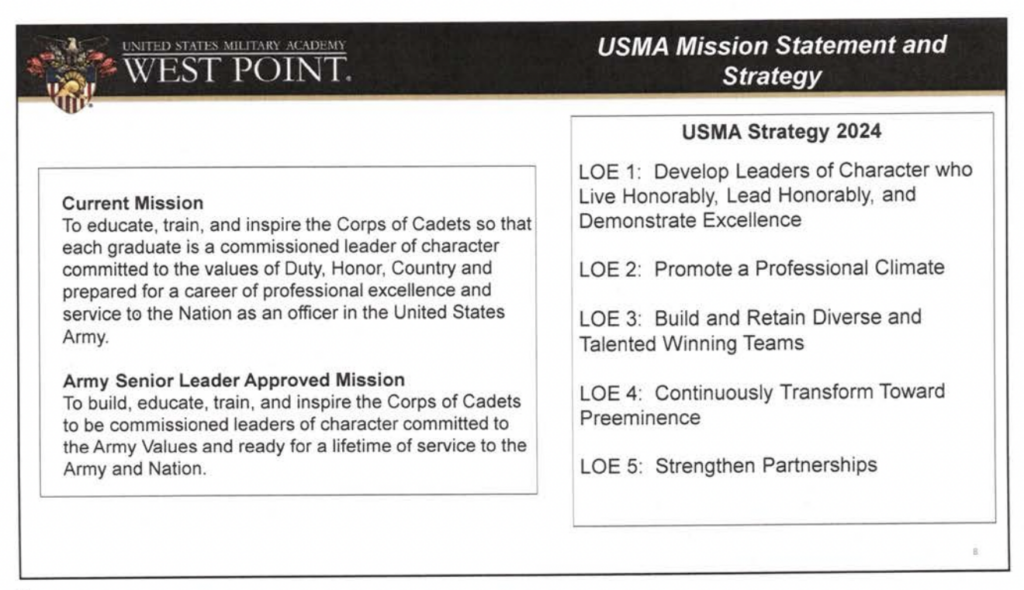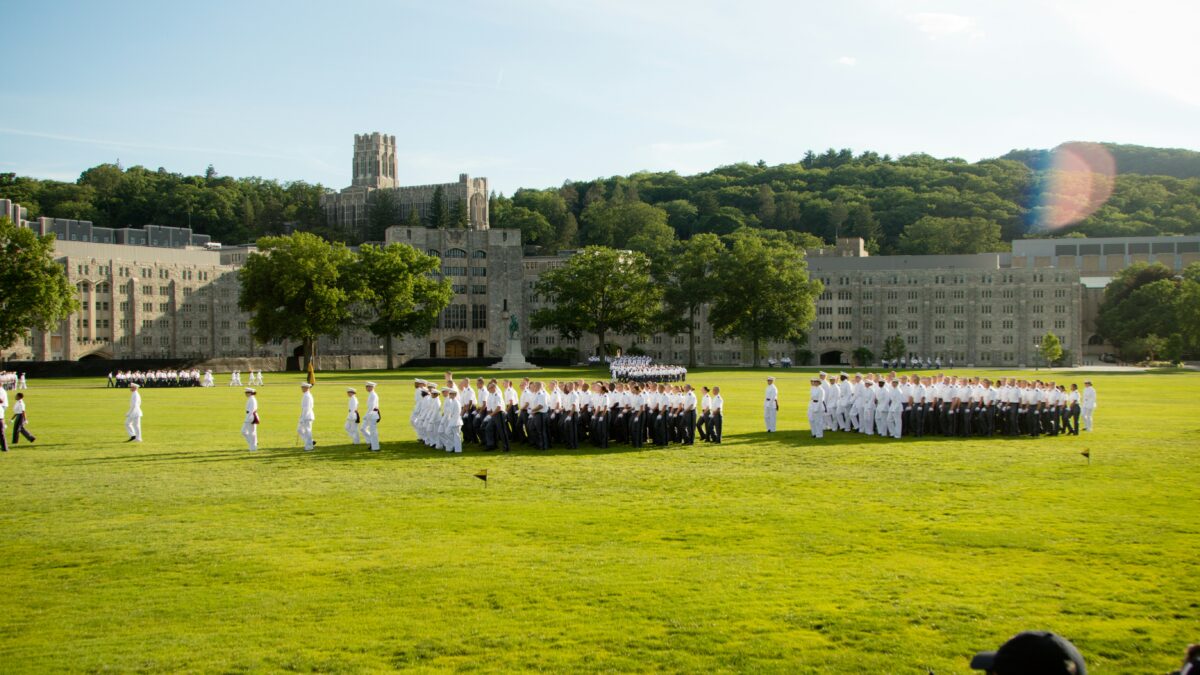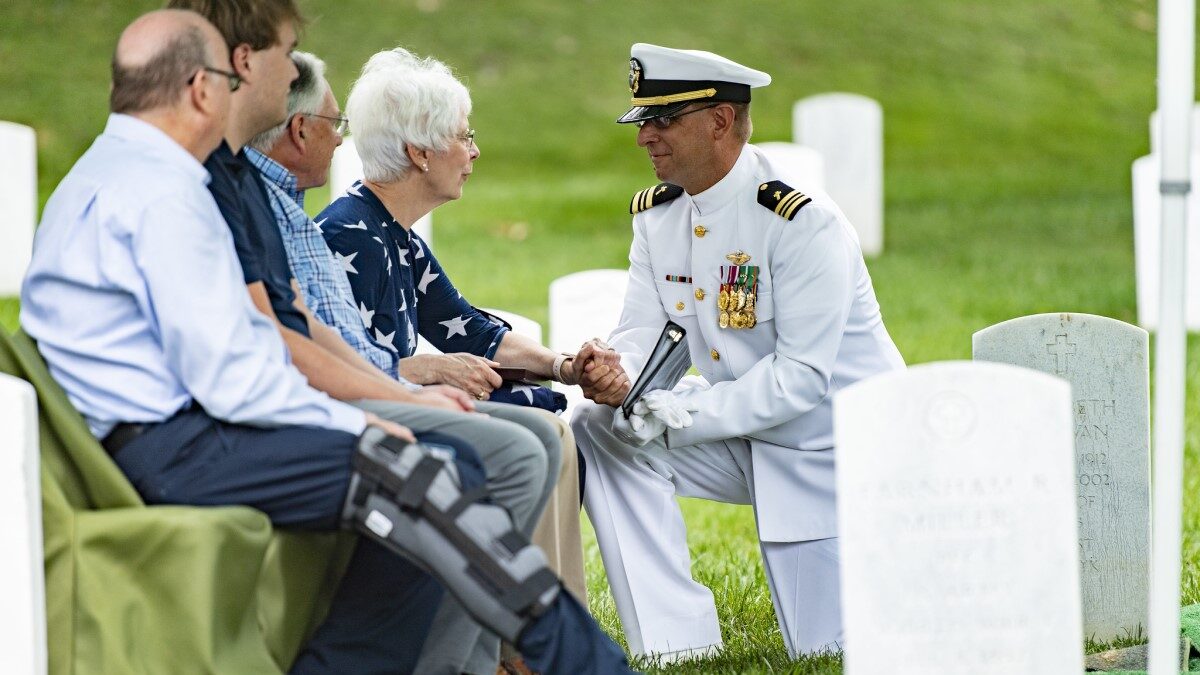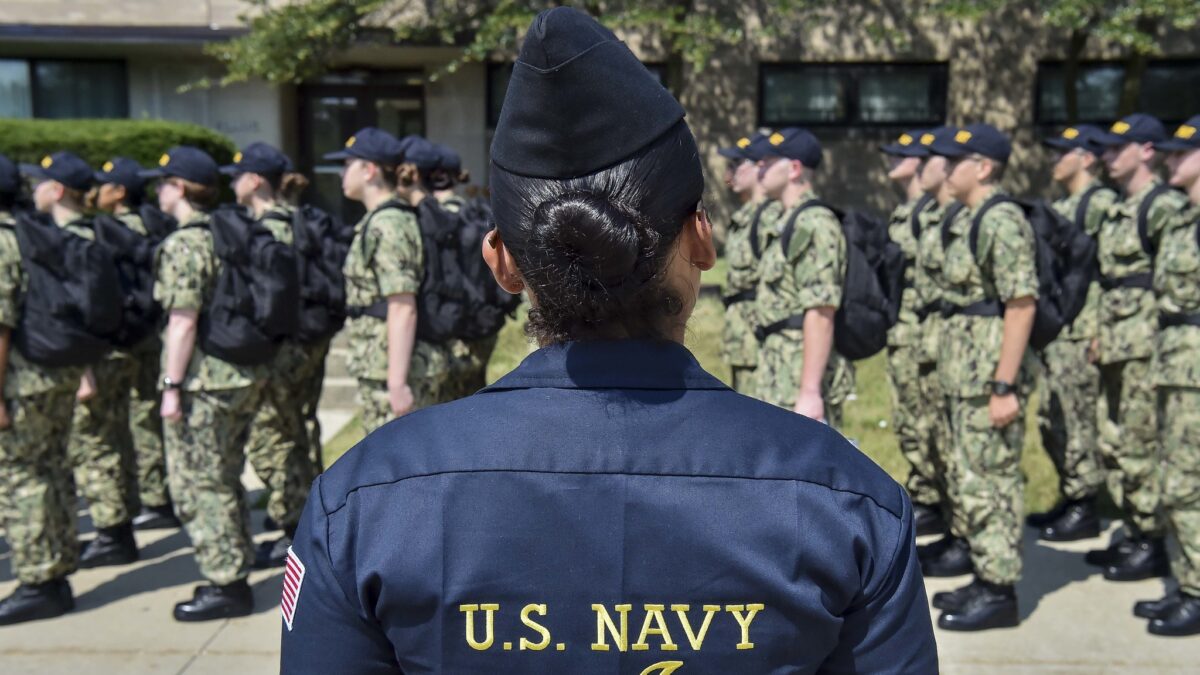On March 7, Superintendent Steve Gilland announced a planned change to the official mission of the U.S. Military Academy at West Point: eliminating the words “Duty,” “Honor,” and “Country.”
It is impossible to overstate the reverence with which those three words have been held at West Point, in the entire Army, and throughout the U.S. military. In his 1962 farewell address to the West Point Corps of Cadets, Gen. Douglas MacArthur encapsulated their meaning for American soldiers:
Duty, Honor, Country — those three hallowed words, reverently dictate what you ought to be, what you can be, what you will be. They are your rallying point to build courage when courage seems to fail, to regain faith when there seems to be little cause for faith, to create hope when hope becomes forlorn.
MacArthur graduated from West Point in 1903. By that time, “Duty, Honor, Country” was already recognized as the official West Point motto. Among many other locations, it is on the West Point crest that is on every graduate’s class ring. It remains the standard for military professionalism.
This is the presentation LTG Gilland gave to the Board of Visitors on March 7, about the change:

Everything — planning, training, execution — is compelled by a military unit’s defined mission. The more simply it can be stated, the better. My favorite example is the mission the Combined Chiefs of Staff gave to Gen. Eisenhower in 1944: “Enter the continent of Europe and, in conjunction with the other United Nations, undertake operations aimed at the heart of Germany and the destruction of her armed forces.”
The West Point mission statement tells all its faculty and staff, exactly what they must do in training new officers. It defines the professional purpose for their existence.
Blowback and the Hasty Release of the New Mission
The change first made news last week in a short article in the Armed Forces Press. On March 11, it was publicized by the MacArthur Society — a group of West Point graduates concerned about West Point’s decline. Its president, Bill Prince, is a West Point graduate and decorated CIA veteran who attended the Board of Visitors meeting where the change was announced.
As news of the change began to spread, the initial reaction by many was that it was fake news. It had to be fake news because “Duty, Honor, Country” is so fundamental to West Point’s core identity, and it was inconceivable that anyone would excise it from the official West Point mission statement. I spoke with several people at West Point who said the decision had not yet been finalized and West Point might even seek congressional approval. Later in the day, likely because of the emerging blowback, Gilland sent a letter to all West Point graduates announcing the change had been implemented.
An officer with whom I spoke emphasized the change was the result of a regular review of the mission statement to see if any changes were needed to “modernize” it. LTG Gilland’s letter made the same point and noted that the mission statement has been changed nine times in the past 100 years. Such changes are sometimes necessary. For example, shortly after women were first admitted as cadets in 1976, the mission statement was modified to make it sex-neutral.
Although I believe his decision was wrong, I do not believe the superintendent intended to diminish the centrality of the West Point motto. LTG Gilland is a patriot, and I believe he has the best interests of West Point and the country at heart. His chief spokesman, Col. Terence Kelley, emphasized that when he told me, “Great young men and women are graduating from West Point to lead soldiers on the battlefield. That is what we are focused on.”
However, many West Point graduates perceive this most recent change to the mission language not as a necessary step of modernization, but as another woke attack on tradition. There have been all too many of those, both at West Point and throughout the country. For example, Robert E. Lee’s name was removed from West Point’s Reconciliation Plaza, which had commemorated Lee’s contribution to the reconciliation of opposing forces and people after the Civil War. The irony of removing any reference to Lee from a memorial to reconciliation apparently escaped the perpetrators of the purge.
What’s more, given what we have learned about “politicization of the curriculum,” “the erosion of the honor code,” and “race and gender-based admissions” — which the MacArthur Society documents in depth — it is understandable why some are skeptical about West Point brass. These policies have undermined the academy leadership’s credibility when they want to justify controversial decisions. And this skepticism is magnified by the reports by many West Point graduates of the administration’s stonewalling of their requests for information.
Do West Point’s Justifications Hold Water? Doubtful
West Point’s principal justification is that they wanted the mission statement to incorporate the “Army Values” adopted in 1995, so “Duty, Honor, Country” had to be removed. Although the motto dates back at least 125 years, West Point officials point out that it was not included in the mission statement until 1998.
The Army Values are virtues no one can rightly quarrel with. But the simplicity of just three words — “Duty, Honor, Country” — has a power far greater than the word salad that comprises the Army Values and their official explanations.
Consider the Army’s description of two Army Virtues, “Duty” and “Honor.” Here is what the Army’s official site has to say about duty:
Fulfill your obligations. Doing your duty means more than carrying out your assigned tasks. Duty means being able to accomplish tasks as part of a team. The work of the U.S. Army is a complex combination of missions, tasks and responsibilities — all in constant motion. Our work entails building one assignment onto another. You fulfill your obligations as a part of your unit every time you resist the temptation to take “shortcuts” that might undermine the integrity of the final product.
Which packs a more powerful punch — that 82-word explanation with all the earmarks of committee manufacture, or MacArthur’s own mission statement in his charge to the corps about what duty requires? He said simply, “[Y]our mission remains fixed, determined, inviolable. It is to win our wars.”
Here is the Army’s explanation of the value of honor in the Army Values:
Live up to Army values. The nation’s highest military award is The Medal of Honor. This award goes to Soldiers who make honor a matter of daily living — Soldiers who develop the habit of being honorable, and solidify that habit with every value choice they make. Honor is a matter of carrying out, acting, and living the values of respect, duty, loyalty, selfless service, integrity and personal courage in everything you do.
Just the first sentence takes us into an endless möbius loop. Contrast that with the simplicity of the Cadet Honor Code: “A Cadet will not lie, cheat, steal, or tolerate those who do.”
Which is more powerful? Which will be remembered forever?
The Risk to the Army’s Mission of Winning Our Wars
Jettisoning the motto from West Point’s mission statement is not wrong just because it dilutes the words. In today’s environment, it poses a real risk to the substance of West Point’s mission.
West Point is not the custodian of the Army Values. They can be changed by political appointees. It is all too easy to envision the day under a “progressive” administration when “Diversity, Equity, and Inclusion” will be included in the Army Values.
If you think that is an exaggeration, please consider that Secretary of Defense Lloyd Austin has officially designated climate change as a critical national security issue that is as much of a threat as Communist China. Can DEI be far behind?
Even though it has now been over a week since LTG Gilland announced the change, and despite the fact that it has encountered a storm of opposition from graduates and others, West Point has never provided any reason why this change was necessary. Absent such an explanation, we are justified in questioning whether people of good faith are being duped by people of bad faith.
As the patriots in the MacArthur Society put it, “Like in many great institutions in the United States of America, progressive ideology is eroding away at West Point and doing so in a slow but methodical march, co-opting our good intentions through the specter of cultural Marxism. Our adversaries are unscrupulous but sophisticated and very patient.”
The last word is reserved for MacArthur’s pure poetry in his closing to the Corps. It again emphasized the importance of those three little words:
“The shadows are lengthening for me. The twilight is here. My days of old have vanished — tone and tint. They have gone glimmering through the dreams of things that were. Their memory is one of wondrous beauty, watered by tears and coaxed and caressed by the smiles of yesterday.
“I listen then, but with thirsty ear, for the witching melody of faint bugles blowing reveille, of far drums beating the long roll. In my dreams I hear again the crash of guns, the rattle of musketry, the strange, mournful mutter of the battlefield.
“But in the evening of my memory alwaysº I come back to West Point. Always there echoes and re-echoes: Duty, Honor, Country.”









